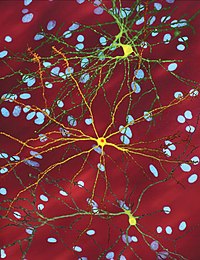
Cerebellar and Midbrain Lysosomal Enzyme Deficiency in Isolated Dystonia
Sign Up to like & getrecommendations! Published in 2022 at "Movement Disorders"
DOI: 10.1002/mds.28937
Abstract: sensory examination, and cognitive functions were normal. The patient was able to walk without support but with extensor trunk posture. Brain and cervical spine magnetic resonance imaging was normal. To identify the disease-causing gene, we… read more here.
Keywords: cerebellar midbrain; information appendix; midbrain lysosomal; patient ... See more keywords

Genetic evaluation of hyperphenylalaninemia patients with tetrahydrobiopterin deficiency in Iranian population: Identification of four novel disease‐causing variants
Sign Up to like & getrecommendations! Published in 2022 at "Molecular Genetics & Genomic Medicine"
DOI: 10.1002/mgg3.2081
Abstract: Hyperphenylalaninemia (HPA) is the most common inborn error of amino acid metabolism worldwide. At least 2% of HPA cases are caused by a deficiency in tetrahydrobiopterin (BH4) metabolism. Genes such as QDPR and PTS are… read more here.
Keywords: genetic evaluation; causing variants; hyperphenylalaninemia; disease causing ... See more keywords

Detection of disease‐causing CFTR variants in state newborn screening programs
Sign Up to like & getrecommendations! Published in 2022 at "Pediatric Pulmonology"
DOI: 10.1002/ppul.26209
Abstract: Newborn screening (NBS) algorithms for cystic fibrosis (CF) vary in the United State of America and include different cystic fibrosis transmembrane conductance regulator (CFTR) variants. CFTR variant distribution varies among racial and ethnic groups. read more here.
Keywords: state; detection disease; cftr variants; disease causing ... See more keywords

Identification of Disease-Causing Mutations by Functional Complementation of Patient-Derived Fibroblast Cell Lines.
Sign Up to like & getrecommendations! Published in 2017 at "Methods in molecular biology"
DOI: 10.1007/978-1-4939-6824-4_24
Abstract: Diagnosis of mitochondrial disorders is still hampered by their phenotypic and genotypic heterogeneity. In many cases, exome sequencing, the state-of-the-art method for genetically diagnosing mitochondrial disease patients, does not allow direct identification of the disease-associated… read more here.
Keywords: disease causing; cell lines; disease; functional complementation ... See more keywords

Identifying disease-causing mutations in genomes of single patients by computational approaches
Sign Up to like & getrecommendations! Published in 2020 at "Human Genetics"
DOI: 10.1007/s00439-020-02179-7
Abstract: Over the last decade next generation sequencing (NGS) has been extensively used to identify new pathogenic mutations and genes causing rare genetic diseases. The efficient analyses of NGS data is not trivial and requires a… read more here.
Keywords: disease causing; causing mutations; genomes single; mutations genomes ... See more keywords

Are reindeer a significant carrier of disease-causing ticks?
Sign Up to like & getrecommendations! Published in 2018 at "Wiener klinische Wochenschrift"
DOI: 10.1007/s00508-018-1329-9
Abstract: We were amused, as we are sure many others were, with the recent commentary by Wormser and Ladenheim [1] that puts forth various hypotheses pertaining to the extraordinary caloric intake and its impact, that may… read more here.
Keywords: reindeer significant; disease causing; causing ticks; carrier disease ... See more keywords

A profound computational study to prioritize the disease-causing mutations in PRPS1 gene
Sign Up to like & getrecommendations! Published in 2017 at "Metabolic Brain Disease"
DOI: 10.1007/s11011-017-0121-2
Abstract: Charcot-Marie-Tooth disease (CMT) is one of the most commonly inherited congenital neurological disorders, affecting approximately 1 in 2500 in the US. About 80 genes were found to be in association with CMT. The phosphoribosyl pyrophosphate… read more here.
Keywords: disease causing; causing mutations; study; disease ... See more keywords

Prioritizing disease-causing microbes based on random walking on the heterogeneous network.
Sign Up to like & getrecommendations! Published in 2017 at "Methods"
DOI: 10.1016/j.ymeth.2017.06.014
Abstract: As we all know, the microbiota show remarkable variability within individuals. At the same time, those microorganisms living in the human body play a very important role in our health and disease, so the identification… read more here.
Keywords: heterogeneous network; disease causing; network; causing microbes ... See more keywords

Singleton exome sequencing of 90 fetuses with ultrasound anomalies revealing novel disease-causing variants and genotype–phenotype correlations
Sign Up to like & getrecommendations! Published in 2022 at "European Journal of Human Genetics"
DOI: 10.1038/s41431-021-01012-7
Abstract: Exome sequencing has been increasingly implemented in prenatal genetic testing for fetuses with morphological abnormalities but normal rapid aneuploidy detection and microarray analysis. We present a retrospective study of 90 fetuses with different abnormal ultrasound… read more here.
Keywords: causing variants; novel disease; singleton exome; disease ... See more keywords

A gene-centric strategy for identifying disease-causing rare variants in dilated cardiomyopathy
Sign Up to like & getrecommendations! Published in 2018 at "Genetics in Medicine"
DOI: 10.1038/s41436-018-0036-2
Abstract: PurposeWe evaluated strategies for identifying disease-causing variants in genetic testing for dilated cardiomyopathy (DCM).MethodsCardiomyopathy gene panel testing was performed in 532 DCM patients and 527 healthy control subjects. Rare variants in 41 genes were stratified… read more here.
Keywords: disease causing; identifying disease; disease; level ... See more keywords

Decoding disease-causing mechanisms of missense mutations from supramolecular structures
Sign Up to like & getrecommendations! Published in 2017 at "Scientific Reports"
DOI: 10.1038/s41598-017-08902-1
Abstract: The inheritance modes of pathogenic missense mutations are known to be highly associated with protein structures; recessive mutations are mainly observed in the buried region of protein structures, whereas dominant mutations are significantly enriched in… read more here.
Keywords: disease causing; causing mechanisms; missense mutations; decoding disease ... See more keywords